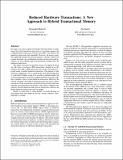Reduced hardware transactions: a new approach to hybrid transactional memory
Author(s)
Matveev, Alexander; Shavit, Nir N.
DownloadShavit_Reduced hardware.pdf (578.4Kb)
OPEN_ACCESS_POLICY
Open Access Policy
Creative Commons Attribution-Noncommercial-Share Alike
Terms of use
Metadata
Show full item recordAbstract
For many years, the accepted wisdom has been that the key to adoption of best-effort hardware transactions is to guarantee progress by combining them with an all software slow-path, to be taken if the hardware transactions fail repeatedly. However, all known generally applicable hybrid transactional memory solutions suffer from a major drawback: the coordination with the software slow-path introduces an unacceptably high instrumentation overhead into the hardware transactions.
This paper overcomes the problem using a new approach which we call reduced hardware (RH) transactions. Instead of an all-software slow path, in RH transactions part of the slow-path is executed using a smaller hardware transaction. The purpose of this hardware component is not to speed up the slow-path (though this is a side effect). Rather, using it we are able to eliminate almost all of the instrumentation from the common hardware fast-path, making it virtually as fast as a pure hardware transaction. Moreover, the "mostly software" slow-path is obstruction-free (no locks), allows execution of long transactions and protected instructions that may typically cause hardware transactions to fail, allows complete concurrency between hardware and software transactions, and uses the shorter hardware transactions only to commit.
Finally, we show how to easily default to a mode allowing an all-software slow-slow mode in case the "mostly software" slow-path fails to commit.
Date issued
2013-07Department
Massachusetts Institute of Technology. Department of Electrical Engineering and Computer ScienceJournal
Proceedings of the 25th ACM symposium on Parallelism in algorithms and architectures (SPAA '13)
Publisher
Association for Computing Machinery (ACM)
Citation
Alexander Matveev and Nir Shavit. 2013. Reduced hardware transactions: a new approach to hybrid transactional memory. In Proceedings of the twenty-fifth annual ACM symposium on Parallelism in algorithms and architectures (SPAA '13). ACM, New York, NY, USA, 11-22.
Version: Author's final manuscript
ISBN
9781450315722